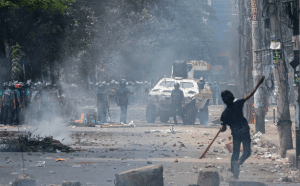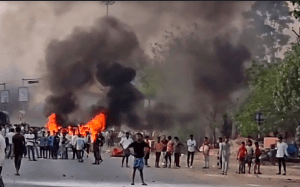New Delhi – In a strongly-worded diplomatic rebuttal, India on Thursday urged Bangladesh to refrain from commenting on the internal matters of the Indian Union, after Dhaka expressed concern over alleged communal tensions in West Bengal’s Murshidabad district. The Ministry of External Affairs (MEA) stated that Bangladesh would “do better” to focus on protecting the rights and safety of its own minority populations.
The official statement from India followed remarks made by the Bangladesh Ministry of Foreign Affairs, which expressed “serious concern” over what it termed as “targeted communal violence against Muslims” in India’s border regions.
“India is a secular, pluralistic democracy with a robust legal framework to address any instances of communal tension. Bangladesh would do well to focus on safeguarding the rights of its own religious minorities—Hindus, Buddhists, and Christians—who have historically faced persecution and violence,” an MEA spokesperson said.
Trigger: The Murshidabad Violence
The current diplomatic friction was triggered by reports of violence during a religious procession in Murshidabad, a district in West Bengal known for its religious diversity and close socio-cultural ties with Bangladesh. According to local media, tensions erupted between communities during a Ram Navami procession earlier this month, leading to sporadic clashes, arson, and destruction of property.
 State authorities deployed additional paramilitary forces and imposed prohibitory orders under Section 144 of the Criminal Procedure Code (CrPC) to control the situation. A fact-finding team has been constituted by the West Bengal Human Rights Commission, and a judicial probe is reportedly underway.
State authorities deployed additional paramilitary forces and imposed prohibitory orders under Section 144 of the Criminal Procedure Code (CrPC) to control the situation. A fact-finding team has been constituted by the West Bengal Human Rights Commission, and a judicial probe is reportedly underway.
Though the state government downplayed the extent of the violence, videos shared on social media went viral in Bangladesh, prompting a formal response from Dhaka.
Bangladesh’s Response: A Rare Diplomatic Move
In a press briefing held in Dhaka, the Bangladesh Foreign Ministry urged Indian authorities to ensure the protection of Muslim communities in the region and called for an “impartial inquiry into the Murshidabad incidents.” The statement further emphasized that Bangladesh, as a “close neighbor,” was committed to “peaceful coexistence and communal harmony” and thus found it necessary to voice concern.
The move, however, was viewed in New Delhi as an unwarranted overreach into domestic law and order matters—a domain constitutionally handled by Indian state governments.
India’s Sharp Counter: Invoking Minority Rights in Bangladesh
India’s response was swift and pointed. MEA officials highlighted historical and recent examples of violence against religious minorities in Bangladesh, including:
-
2021 Durga Puja attacks, where at least 10 Hindus were killed and dozens of temples vandalized.
-
Repeated desecration of Hindu idols during religious festivals.
-
Reports by international human rights groups flagging concerns about institutional discrimination and mob violence against minority communities in Bangladesh.
“The safety of minorities in Bangladesh remains a global concern, and India has consistently raised these issues in bilateral and international forums,” an Indian official stated.
India’s position, analysts say, was not only a defense of national sovereignty but also a strategic reminder of Bangladesh’s own human rights record.
Diplomatic Analysts: A New Tone in South Asian Engagement
India’s blunt messaging marks a shift from the traditionally cordial tone it has used with Bangladesh—a country considered one of its most important strategic partners under the “Neighbourhood First” policy. However, recent years have seen occasional strain due to sensitive issues such as:
-
Border killings of Bangladeshi nationals by the BSF
-
Citizenship Amendment Act (CAA) and NRC protests
-
Water-sharing disputes over the Teesta River
-
Rising Chinese influence in Bangladesh’s infrastructure sector
According to Prof. Sanjay Bhardwaj, South Asia specialist at Jawaharlal Nehru University,
“India’s tone suggests it is no longer willing to allow regional partners to comment freely on internal matters without consequence. It’s also a sign of growing diplomatic assertiveness.”
Public Sentiment and Political Undercurrents
The issue has also entered political discourse in both countries. In India, opposition leaders have called for transparency in the Murshidabad investigation while cautioning against communal polarization. In Bangladesh, ruling party members of the Awami League are reportedly using the incident to appeal to their conservative voter base ahead of regional elections.
However, civil society leaders on both sides have called for restraint and maturity in handling such sensitive incidents, urging governments to maintain mutual respect and prioritize bilateral cooperation.
Conclusion: Strong Ties, Temporary Strain


India reiterated that law and order is a matter for local authorities and that sensationalism around isolated incidents only serves to embolden extremists on both sides.
“We remain committed to maintaining constructive and respectful bilateral relations with Bangladesh,” the MEA noted in its final line.
For official statements and updates, visit the Ministry of External Affairs website.
For more real time updates, visit Channel 6 Network.

